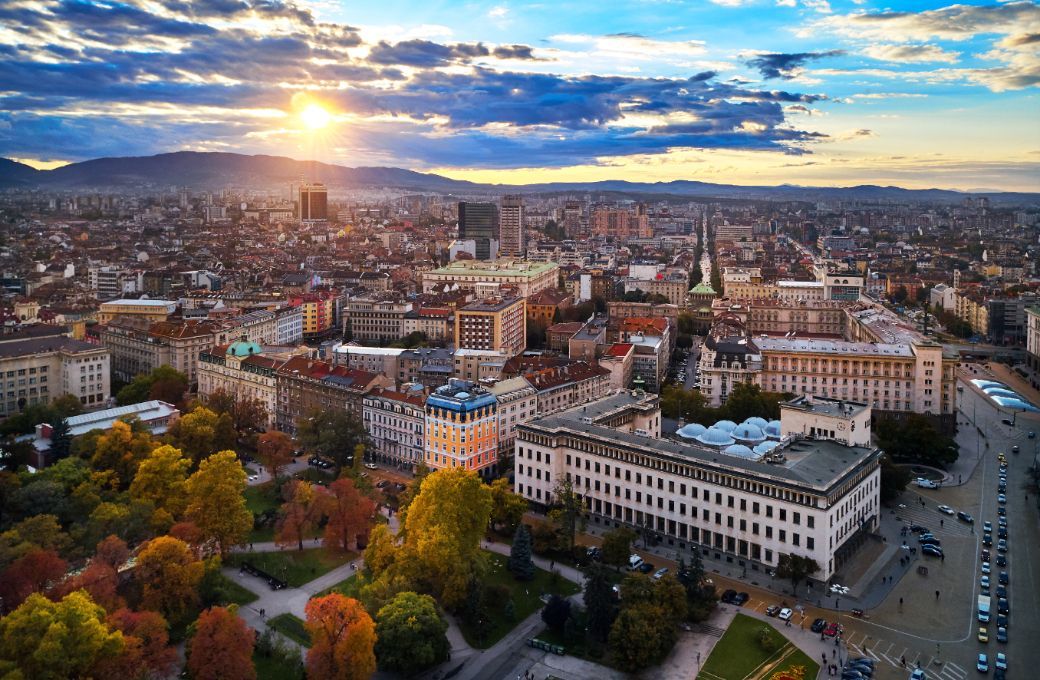Sofia has been a meeting point of world cultures since antiquity. The city is a great melange of architectural periods and styles: 4th-century Roman churches nestle against medieval Bulgarian Orthodox, and 15th-century Ottoman opulence is set against imposing Socialist Realism and glassy business districts that have sprouted since the 1990s. The Sofia Philharmonic Orchestra, based at Bulgaria Hall near the central City Garden, is also a significant meeting point for musicians from across the continent – this year’s season boasting a roster of top-flight soloists.

Chief conductor Nayden Todorov opens the 2024 season on 19th September with the starry duo of Augustin Hadelich and Gautier Capuçon, who visit Sofia to perform Brahms’ Double Concerto for violin and cello. Todorov partners this meeting of minds with Saint-Saëns’ grand Organ Symphony, and the Ritual Dance from Veselin Stoyanov’s opera Salambo, one of a handful of pieces by Bulgarian composers this season.
Thomas Sanderling guests with the Sofia Philharmonic soon after, in another programme featuring Brahms: in this instance, the classic late-romantic Fourth Symphony. This is paired, appropriately enough, with Bruch’s First Violin Concerto, performed by Austrian violin virtuoso Lidia Baich, making for a distinctly Austro-German evening. (A curious coincidence: both Sanderling and Baich were born in Russia, but are German and Austrian citizens respectively.)
Two other great Austro-German musicians make appearances in Sofia in the early autumn: the first being Jonas Kaufmann, in an opera gala evening featuring a bricolage of Léhar, Puccini and Strauss. Then, Austrian pianist Stefan Vladar appears on 3rd October in an all-Beethoven evening, playing and conducting the Emperor Concerto, followed by the always dance-like Seventh Symphony. (Sofia hosts a second opera gala evening later in November with famed soprano Angela Gheorghiu – the programme yet to be announced.)
Music by Pancho Vladigerov, probably Bulgaria’s most celebrated composer, makes an appearance later in October, with his Seven Symphonic Dances. This is juxtaposed against Gustav Holst’s cosmic dances, The Planets, and another starry soloist: Joshua Bell, in Sofia to perform Wieniawski’s Second Violin Concerto. Vladigerov’s dances can be favourably compared to Rachmaninov’s Symphonic Dances, performed a few days later with conductor Yi-Chen Lin. She is joined by South Korean virtuoso Soyoung Yoon for Prokofiev’s First Violin Concerto.
Bulgarian violinist Svetlin Roussev also makes an appearance in late October. Known for his advocacy of Slavic and Bulgarian repertoire (including Vladigerov), this evening is in fact an all-French programme, with Roussev performing Saint-Saëns’ Third Violin Concerto, as well as his evocative (if a little picturesque) Caprice Andalous for violin and orchestra. More timeless is Fauré’s Requiem, which rounds out the programme – marking a century since the composer’s death in 1924.
At the end of October, renowned Polish conductor Antoni Wit arrives in Sofia for an all-Polish programme. Featuring Lutosławski’s Concerto for Orchestra – one of the composer’s greatest early masterpieces – the programme also includes some more unusual repertoire from early 20th-century composer Mieczysław Karłowicz, and a more recent work from Wojciech Kilar, written in commemoration of Karłowicz. There can be no better guide to the depth of Polish music than Wit, who is a prolific recording artist, selling more than 5 million records.
Leading Bulgarian musicians Georgi Cherkin and Rossen Milanov appear later in November, with Cherkin performing Mozart’s clear-as-water Piano Concerto no. 23 in A major, and Milanov conducting Richard Strauss’ towering Alpensinfonie. Bulgarian conductor Georgi Dimitrov leads a strikingly Germanic programme a few days later, comprising music of arch-enemies Wagner and Brahms, including the latter’s relatively unusual Schicksalslied (Song of Destiny), featuring the National Philharmonic Choir. Soprano Gabriela Georgieva joins for the Wagnerian selections, including the overpowering Liebestod from Tristan und Isolde.
The National Philharmonic Choir are back in early December for Verdi’s always spectacular Requiem, conducted by Michel Tabachnik and featuring a slew of Bulgaria’s finest vocal soloists. Bulgarian violinist Lora Markova is also appearing in December, alongside her compatriot Viliana Valcheva, one of Bulgaria’s brightest young conductors. A nostalgic programme is on offer: Smetana’s Má vlast, Tchaikovsky’s Violin Concerto and Elgar’s Enigma Variations, to warm the cockles in the depths of winter.
Nayden Todorov also returns at the end of the year, to lead the Christmas and New Year’s Concerts (programmes to be announced). He’s also joined by South African violinist Daniel Hope, making a return to Sofia after his last appearance in 2022. This American-flavoured programme features song suites from Gershwin and Weill, as well as Korngold’s Symphony in F sharp major, written when the composer was only a teenager. (Korngold would later find success as a film composer in Hollywood.) The programme is rounded out with selections from Alexander Vladigerov’s music theatre The Wolf and Seven Goat Kids: the son of the older composer Pancho, this piece, which derives from the eponymous Brothers’ Grimm story, places Alexander as a firm heir to Weill.
See all listings for upcoming performances by the Sofia Philharmonic Orchestra.
This article was sponsored by the Sofia Philharmonic Orchestra.


